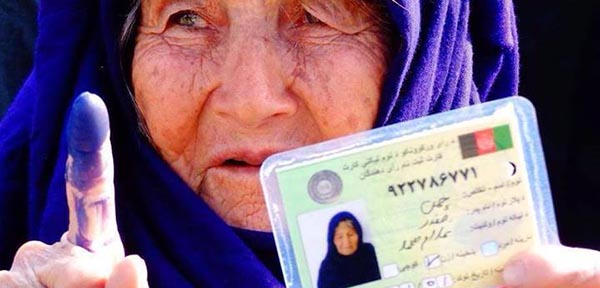Heavy rain and repeated threats from the Taliban could not deter the millions of Afghans who flocked to the polling centers on April 5th to claim their right to a democratic future for their country. Amidst the violence that plagued Afghanistan leading up to election day, Taliban largely failed to interrupt the polling, despite their serial threats.
This election was different. The voting public has become educated and more sophisticated in their understanding of the political process, turning their focus on the candidate’s strategies and campaign platforms, rather than the individuals themselves.
Massive participation of Afghans in the election guaranteed the endurance of the Islamic Republic of Afghanistan and was a strong response to those who think with violence and destruction they can undermine the Afghan's resolve. It was a strong statement supporting the institutionalization of democracy in the country
The electoral campaigns conducted by the presidential candidates demonstrated their political maturity. During the campaigns, only four out of eight candidates were accused of minor offenses and subsequently fined by the Electoral Complaints Commission.
AFGHAN LED SUCCESS
This election, unlike previous ones in 2004 and 2009, was Afghan led. Polling was closely monitored by nearly 325,000 observers from 67 Afghan, and 16 international institutions. There were 71 local media, 45 international media, 31 political parties, eight presidential elections candidates and 2,700 provincial council nominees also monitoring that the election was conducted in a free and fair manner.
Although this is the third presidential election in Afghanistan, it is the first time that the transfer of power from one president to another takes place via the ballot box. This is a historical achievement for our country which has spent more than three decades in conflict.
While more than 8 million people voted in the 2004 presidential election, the number declined to over 4 million in 2009. In the current elections, more than 3.8 million new voting cards were distributed with over 32% of them issued to women. Voting rate has turned out to be proportional with 36% of the 7 million ballots reportedly cast by women.
This election is not only important for who would become the next president, but also important in terms of institutionalization of political turnover of power through a democratic process. The most significant achievement of Afghanistan since 2001 is the elections and participation of substantial numbers of men and women in this political exercise. One of the pivotal legacies of President Karzai, as the first democratically elected president, is the execution of transparent and fair election in Afghanistan.
This election is a turning point. A new chapter begins in the political life of the country. Any other means of securing power other than public voting will no longer be valid and acceptable. As an Afghan citizen, I believe while the results of the election are important, it is equally important that the election is completed and has become deeply embedded in the country's political system.
Mass participation of the people in this election, on one hand, has led the newly born democracy of Afghanistan to its right path. On the other hand, it shows our people's trust in the national electoral institutions and security forces. Lastly, it also sends a powerful message to those who are trying to destabilize the country and who believe that with the withdrawal of international forces, the balance of power will be shifted. By casting their votes, Afghans clearly said "No" to extremism and said "Yes" to democracy.

